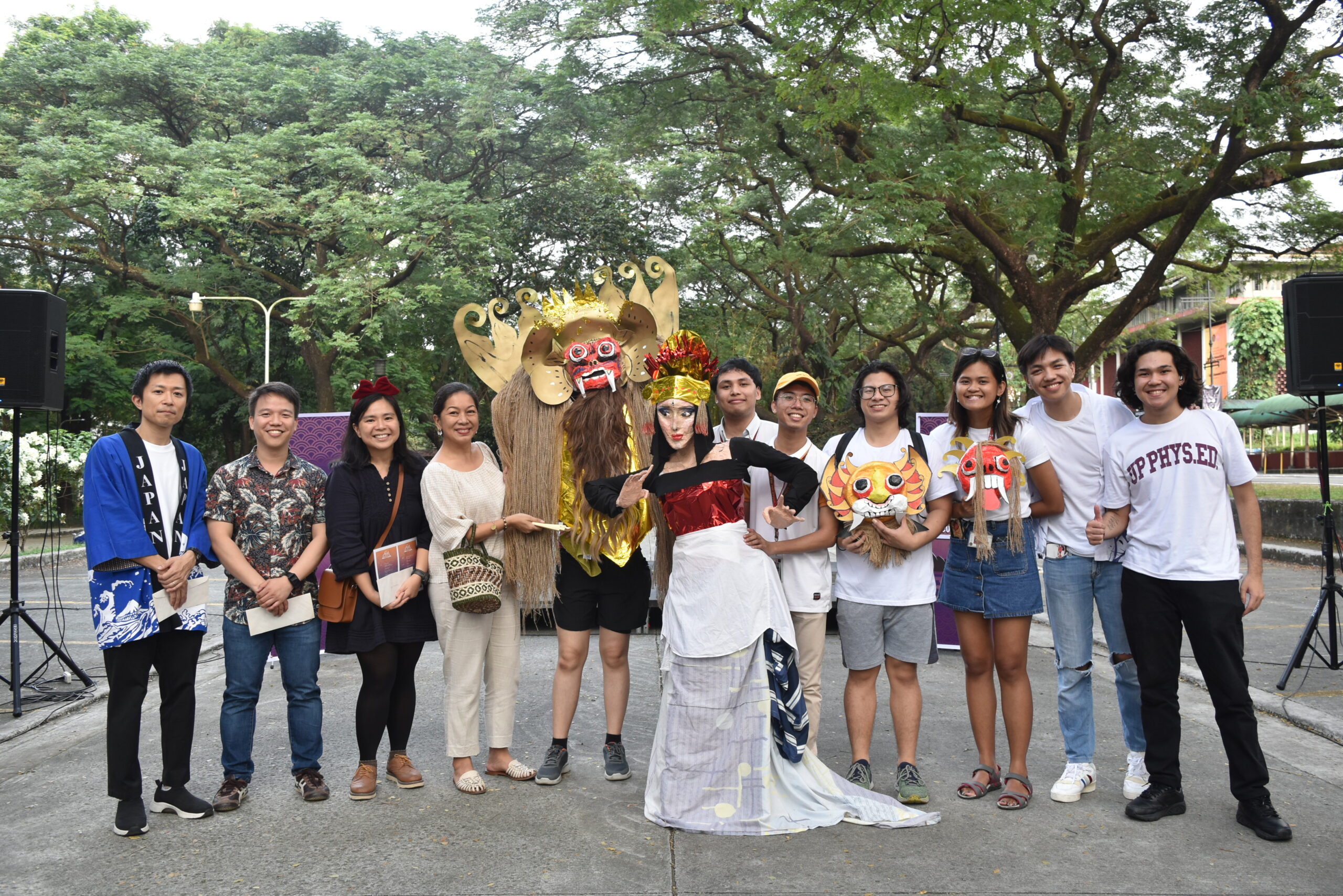Plan B
This track allows students to specialize in linguistics along with a foreign Southeast Asian language. Currently, only the Bahasa Malaysia/Indonesia language program is available for Plan B students. This track is ideal for students who want to specialize in a language that is closely related to and share a lot of linguistic features with Philippine languages. Knowledge in a closely-related Austronesian language will be useful for students who are interested in historical linguistics and language change.
Program Requirements
Core Courses
| Course Code | Course Title | Units |
|---|---|---|
| Lingg 110 | Introduction to Linguistics (Introduksyon sa Linggwistiks) | 3.0 |
| Lingg 115 | Linguistic Analysis (Linggwistik na Analisis) | 3.0 |
| Lingg 120 | Reading and Writing Research in Linguistics (Pagbabasa at Pagsusulat ng Riserts sa Linggwistiks) | 3.0 |
| Lingg 121 | Linguistic Survey of the Philippines (Linggwistik na Sarbey ng Pilipinas) | 3.0 |
| Lingg 125 | Introduction to Field Methods (Introduksyon sa mga Pangfild na Metod) | 3.0 |
| Lingg 130 | Structure of a Philippine Language (Istruktura ng Isang Wika sa Pilipinas) | 3.0 |
| Lingg 132 | Structure of Bahasa Indonesia/Malaysia (Istruktura ng Bahasa Indonesia/Malaysia) | 3.0 |
| Lingg 140 | Introduction to Grammatical Theories (Introduksyon sa mga Grammatikal na Teorya) | 3.0 |
| Lingg 150 | The Austronesian Language Family (Ang Familya ng mga Wikang Ostronesya) | 3.0 |
| Lingg 165 | Phonological and Morphological Comparison of Philippine Languages (Ponolojikal at Morpolojikal na Pagkokompara ng mga Wika sa Pilipinas) | 3.0 |
| Lingg 166 | Syntactic and Semantic Comparison of Philippine Languages (Sintaktik at Semantik na Pagkokompara ng mga Wika sa Pilipinas) | 3.0 |
| Lingg 180 | Language Issues in the Philippines (Mga Problemang Pangwika sa Pilipinas) | 3.0 |
| Lingg 190 | Structures of Selected Languages (Istruktura ng mga Wika) | 3.0 |
| Lingg 197 | Special Topics in Linguistics (Natatanging Paksa sa Linggwistiks) | 3.0 |
| Lingg 199 | Research Methods in Linguistics (Mga Metod ng Reserts sa Linggwistiks) | 3.0 |
Bahasa Indonesia/Malaysia Course
| Course Code | Course Title | Units |
|---|---|---|
| B Ind/Mal 10 | Elementary Bahasa Indonesia/Malaysia I (Elementaring Bahasa Indonesia/Malaysia I) | 3.0 |
| B Ind/Mal 11 | Elementary Bahasa Indonesia/Malaysia II (Elementaring Bahasa Indonesia/Malaysia II) | 3.0 |
| B Ind/Mal 12 | Intermediate Bahasa Indonesia/Malaysia I (Intermidyet na Bahasa Indonesia/Malaysia I) | 3.0 |
| B Ind/Mal 13 | Intermediate Bahasa Indonesia Malaysia II (Intermidyet na Bahasa Indonesia/Malaysia II) | 3.0 |
| B Ind/Mal 100 | Advanced Bahasa Indonesia/Malaysia I (Advans na Bahasa Indonesia/Malaysia I) | 3.0 |
| B Ind/Mal 101 | Advanced Bahasa Indonesia/Malaysia II (Advans na Bahasa Indonesia/Malaysia II) | 3.0 |
| B Ind/Mal 110 | Readings in Bahasa Indonesia/Malaysia (Mga Babasahin sa Bahasa Indonesia/Malaysia) | 3.0 |
| B Ind/Mal 111 | Advanced Composition in Bahasa Indonesia/Malaysia (Advans na Komposisyon sa Bahasa Indonesia/Malaysia) | 3.0 |
Social Science Courses
| Course Code | Course Title | Units |
|---|---|---|
| Anthro 100 | General Anthropology | 3.0 |
| Kas 114 | Cultural History of the Philippines | 3.0 |
| Psych 101 | Introduction to Psychology | 3.0 |
| Socio 101 | General Sociology | 3.0 |
GE and Other Required Courses
| Course Code | Course Title | Units |
|---|---|---|
| ARTS 1 | Critical Perspectives in the Arts | 3.0 |
| Eng 13 | Writing as Thinking | 3.0 |
| Fil 40 | Wika, Kultura, at Lipunan | 3.0 |
| Kas 1 | Kasaysayan ng Pilipinas | 3.0 |
| Math 2 | Mathematics in Everyday Life | 3.0 |
| Math 10 | Mathematics, Culture and Society | 3.0 |
| Philo 1 | Philosophical Analysis | 3.0 |
| Soc Sci 2 | Social, Economic and Political Thought | 3.0 |
| Speech 30 | Public Speaking and Persuasion | 3.0 |
| STS 1 | Science, Technology and Society | 3.0 |
| PI 100 | The Life and Works of Jose Rizal | 3.0 |
| GE Electives | Five general education courses (List of GE Courses) | 15.0 |
| PE | Four physical education courses | (8.0) |
| NSTP | Two courses under the one of the National Service Training Program components: Civic Welfare Training Service (CWTS), Literacy Training Service (LTS) and Reserved Officer’s Training Corps Military Science (ROTC Mil Sci) | (6.0) |
Career Prospects
Graduates of the Plan B track are expected to develop a high proficiency in Bahasa Indonesia/Malaysia upon their completion of the program. This, coupled with their training in linguistic analysis, makes them well-equipped to engage in translation and interpretation work, as well as in language teaching.
In general, our BA program aims for its students to develop a wide array of skills that are applicable to many jobs. Aside from developing students’ skills for linguistic analysis, students also have the opportunity to practice and develop their problem-solving skills, critical thinking skills, interpersonal communication skills, creativity, as well as their sociocultural awareness. Many of the graduates of our undergraduate program are therefore engaged in a wide variety of fields such as language education, teaching in higher education, research and data analysis, publishing, media and advertising, marketing, foreign service, and human resource management.
< Go back to Undergraduate page

